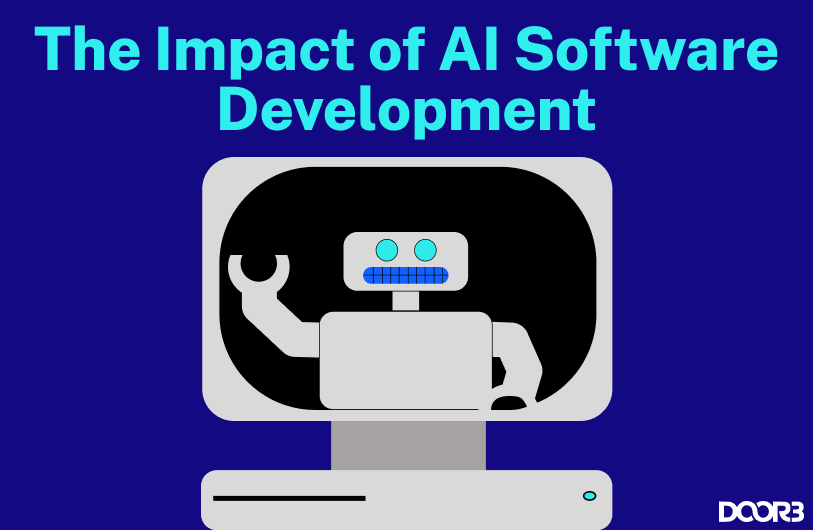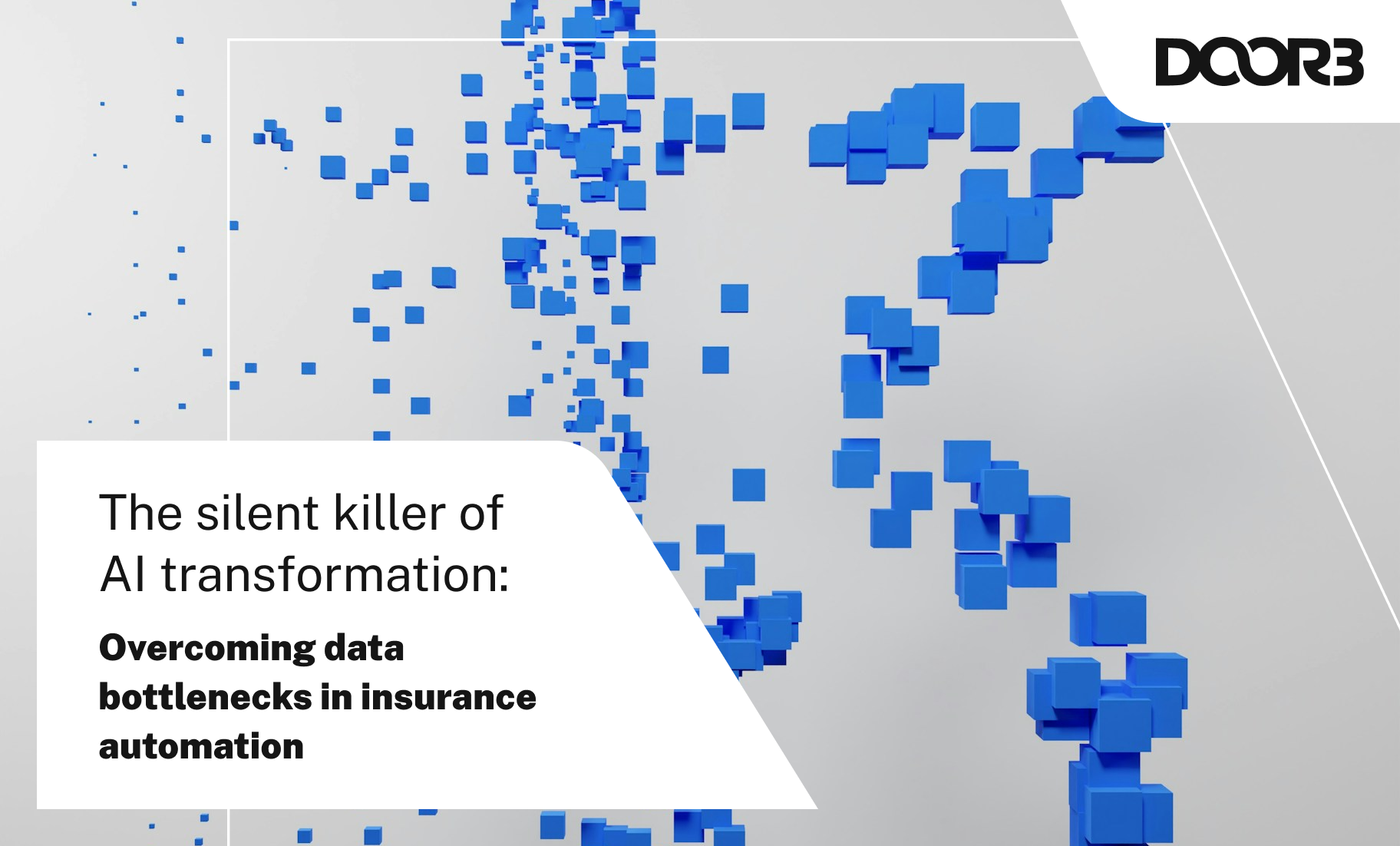The Impact of AI Software Development
05.28.2024
The Impact of AI Software Development
TLDR; AI is becoming ubiquitous and its promise of replacing some traditional development methods is compelling, but it won’t replace developers. While the technology increases speed and efficiency in software development, it struggles with complexity and reliability. Developers will work with AI as a tool, but narrow AI will always need human intervention.
The digital elephant in the room
AI is everywhere. Whether it’s OpenAI releasing the newest version of ChatGPT (while simultaneously catching heat for ripping off a high profile celebrity’s voice) or booting up your PC to be harassed by the Copilot widget, our world is more and more dominated by simulations of human thought – simulations that are becoming ever more persuasive.
Corporations are going all in, advancing a view that AI software development will turn the industry into a playground of drag and drop solutions that require no technical skills. Say goodbye to traditional development, AI software development will clear the competition.
Or will it?
While there’s no denying the potential for AI software development to become an invaluable tool across development services, claiming a grand obviating of software developers is at best, putting the cart before the horse, and at worst, a total pipe dream.
Let’s take a look at the world of AI software development, without rose-tinted glasses, to see what’s really in store for the near future of this technology.
AI software development today

While AI software development companies might feel like they arrived suddenly and without warning, AI has been creeping into our everyday lives for quite some time now. With what many consider the advent of AI coming from a 1956 Dartmouth workshop, decades of hard work has been invested to get AI software development to where it is today.
But where is AI software development today?
Today, AI in software development has many extremely practical uses. AI in software development can review code after a development sprint and support QA practices, expedite code translation for legacy software migration, and can introduce automated scripts and predictive maintenance in DevOps practices.
“From a DevOps perspective we’ve used AI to say ‘Hey, give me a script that will move files from this directory over to here and sync it up with the new platform’” said Robert Miller, DOOR3’s Principal Solution Architect
“So we could type that into ChatGPT and it will put out a decent script. I’d say for the time being that’s probably the standard interaction with AI in terms of AI tools for software development that actually help.”
Laena Ilk, DOOR3’s Director of Solution Architecture, had this to say about AI software development from a QA standpoint.
“In a technical delivery capacity, AI can be employed for automating the testing and quality assurance processes. By leveraging AI-powered testing tools and frameworks, software development teams can significantly reduce manual effort and time required for testing new features or updates. AI algorithms can analyze code changes and automatically generate test cases, identify potential bugs, and even predict areas of the codebase that are prone to errors.
This not only speeds up the delivery process but also enhances the overall quality and reliability of the software being delivered. Additionally, AI can be used for continuous monitoring and analysis of system performance, helping to identify and address any technical issues or bottlenecks that may arise during the delivery process.”
So, AI in software development has some very practical uses. Can I ax my development team now and leave all my development to a language model?
You could, but you’ll never complete a project if you do so. AI software development is exciting, but thinking that this technology has the capability to replace an experienced developer is a little bit like throwing the baby out with the bathwater, generally not recommended.
Let’s look at the overarching advantages of AI in software development, and some of the challenges it faces.
Advantages and challenges of AI in development
In a world focused on the highest productivity possible, AI software development services are a wet dream. AI’s two biggest selling points are simple: Speed and efficiency.
AI software development services accelerate mundane and repetitive tasks, as DOOR3’s DevOps Practice Lead, Dmytro Onypko, shares while discussing legacy system migrations.
“We see plenty of clients that have an old code base written in something like Visual Foxpro or another ancient technology, and they want to migrate to Python codeways or something more modern. Given that this is a legacy system, there are going to be a lot of lines of old logic, and when you transfer from one language to another language, it’s different to what’s previously been built. Most of the time there is a lot of menial and repetitive work just transferring the syntax.
Using one of the free open source large language models, I can tell it that I just need the code base transferred from A to B and to not include any suggestions at all. We will review what it has done, adjust, fix and roll over. Using a language model results in a considerable decrease of time needed to do the transition.”
So there you have it, AI software development services can make your horse the fastest at the derby…though it may be prone to lying about how fast it was going as well.
Challenges with AI software development services
If the benefits of AI in software development can be summed up in two words, then so can its challenges. Those two words? Complexity and reliability.
“The truth is that AI is unreliable. The more you ask from AI the more the probability is that it will either make a mistake or just plainly hallucinate.” said Dmytro.
Hallucinate? Like a desert mirage? Kind of, but without the climate.
AI hallucinations are a phenomenon where an AI system generates an output that while sounding true, is factually incorrect or totally unrelated. It’s a simple concept that can get you in a whole lot of trouble, as two New York lawyers learned after being sanctioned for using AI in a legal brief, where the AI made up six fictitious case citations.
So no, blindly trusting a language model with your migration of potentially decades of data is not a good idea. Or really, any software development project.
“You’ve still got to change all the properties and there’s still plenty of manual adjusting required.” Robert said.
“Right now, code generators are pretty prescriptive. We could spend a lot of time developing a code generator that does what we want it to at the click of a button, but project to project, that creates more complexity than simply doing it ourselves.”
Human intervention is still very much a necessity with software projects using AI, and it’s likely to be that way for quite some time, potentially forever. Until the advent of general AI begins, AI can’t be trusted to build something so complex on its own, and the jury is still out on whether or not general AI is even feasible.
So if the future of androids taking over was the unrealistic future of your expectations, what does the actual future of AI software development look like?
Future predictions and trends for AI software development

So where is AI going if not replacing your local software developer? Our team has a few predictions.
Decreased front-end work
“I think one possible direction for the future is that there will be less and less front-end work.” Dmytro posited.
“Imagine you need spreadsheets with dedicated views for dedicated reports. They’re quite rigid currently, if you want to make a change in what aggregates, it means that you need a developer to make that change.
My prediction is the removal of the necessity for that front-end work. If an AI model can already speak the language and it does well, rather than have a dedicated spreadsheet or a dedicated report, you could just use your natural language and ask for a model. ‘Please get me the aggregation of some value for this or that and it just generates dynamic content based on your request, eliminating that rigidity. The question is if people will start accepting that you don’t need that much of a front end anymore with this technology.”
The evolution of the IDE and CRUD

An Integrated Development Environment (IDE) is a software application that provides comprehensive facilities for software development, combining several tools required into a single graphical user interface (GUI). IDE’s simplify the development process, and Robert believes AI may simplify it even more.
“I could see AI in software development being used as an architectural tool. We have this enterprise level thing that has all of these features. Let me tell my IDE what my feature set is and it’ll tell me the best design patterns to use, as an example.
If the IDE could make suggestions of where it would need to make some of those modifications for your specific code base that you’re working on that would be very useful. Where it’s something right now that’s very hard for code generators to do because they’re just so prescriptive with it.”
I think it’ll be able to be used by all developers as well. Senior to mid to anyone on the development team. I could see a lot of things that we do for CRUD (Creating, Reading Updating, Deleting entities) being supported by AI as a lot of that’s pretty boilerplate. I could see AI understanding some of those little things that you manually have to change and marry it with a code generator and then essentially have your whole list of entities, you know, your data model for your domain.”
A future alongside not replaced
AI in software development isn’t going anywhere, but neither are skilled developers. If anything, the demand for experienced developers may increase, as faster work can lead to more projects at once, and more projects at once leads to more mistakes that a human needs to correct.
Until general AI enters the realm of possibility, any work completed by AI in software development needs to be reviewed by a human, and perhaps that’s for the better. It’s our world, AI is just existing in it. This technology can do a lot of work for us across a spectrum of industries and projects, but it can’t replace creativity, ingenuity, or passion. All of which are qualities that DOOR3 developers lead with when they step into the room. Want to know more about the work we do in software development? Book some time with us.
FAQ: AI Software Development

Q1: What is AI software development?
A1: AI software development involves developing software applications utilizing AI to assist during the process or that is incorporated into the product to enhance functionality.
Q2: What services do AI software development companies provide?
A2: AI software development companies offer a wide range of services including but not limited to:
-
Custom AI solutions tailored to specific business objectives
-
The integration of AI tools for software development
-
Machine learning models development
-
AI automation of business processes
-
AI adoption consulting
Q3: How do artificial intelligence companies differ from traditional software development companies?
A3: Artificial intelligence companies specialize in developing and integrating AI technologies into software applications, whereas traditional software development companies may not have this specialized focus.
Q4: Why should businesses consider partnering with an AI software development company?
A4: Partnering with an AI software development company can help with accelerating innovation, enhancing data analysis, developing smarter and more responsive applications, and improve efficiency through automation.
Q5: What are some AI tools for software development?
A5: Some AI tools for software development on the market include but are not limited to:
-
TensorFlow
-
DataRobot
-
IBM Watson
-
Keras
-
PyTorch
Q6: What role does an artificial intelligence development company play in the tech industry?
A6: An artificial intelligence development company pushes the boundaries of what is possible with AI technology, helping businesses to improve efficiency and solve challenges within their operations. Any technology that can be used to increase productivity increases the interest and investment opportunities in the tech space.



